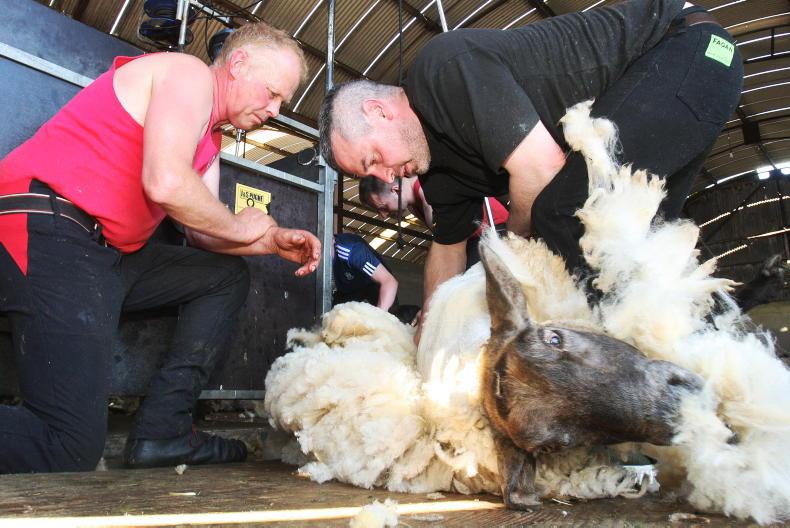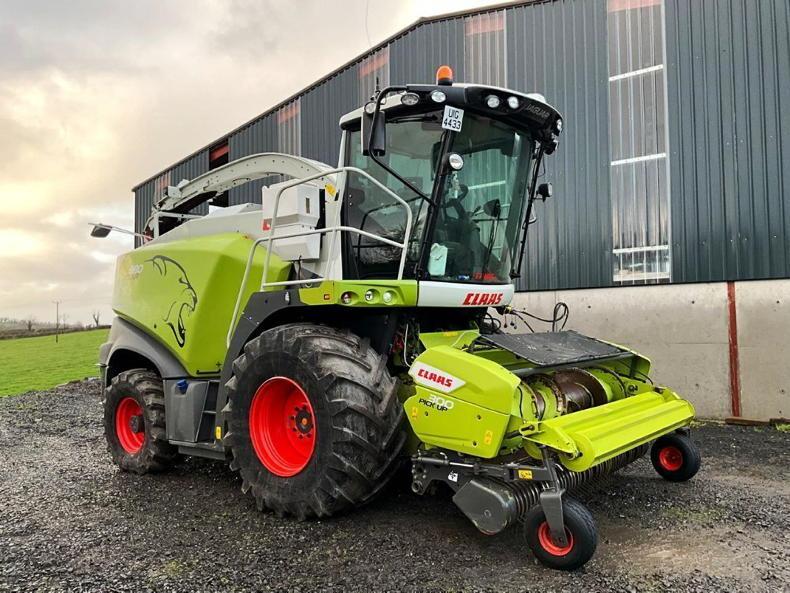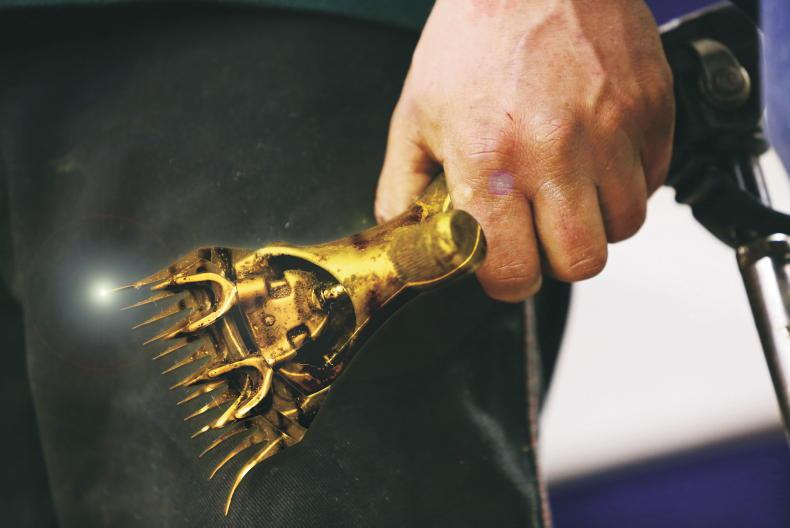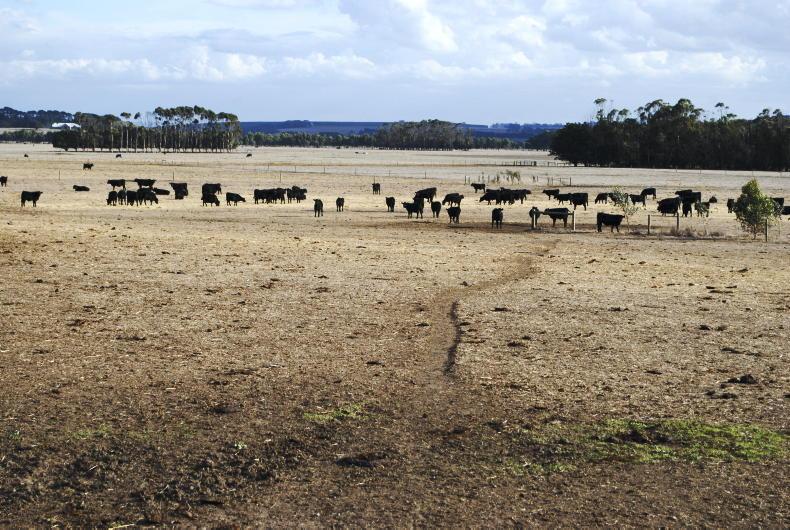The payout for the 2022 clip delivered by farmers to British Wool/Ulster Wool will be “fractionally down on last year”, the organisation’s chief executive, Andrew Hogley has said.
Speaking to the Irish Farmers Journal at the Balmoral Show, Hogley predicted the price would end up at around 30p/kg for Mules and Texels and approximately 20p/kg for Blackface wool. Last year, British Wool made payments worth £8.4m to members for the 2021 clip, at an overall average of 36.4p/kg.
The payout in 2022 was up 135% on the previous year, and at the time, it was thought further price rises were possible. However, issues such as increased costs in wool processing and consumer price inflation have negatively affected the wool market.
“Every fleece that goes through a scouring plant – the cost is up 30% this year. That’s 29p/kg increased to 39p/kg. And that is the cheapest part of processing,” said Hogley. He added that further down the supply chain, the likes of spinning is labour intensive, so wage inflation has had an impact.
Demand
In terms of demand for wool, businesses and consumers have cut back on upgrades and home improvements due to the high cost of living, while over 10% of UK hospitality businesses (users of wool carpets) have closed since the start of COVID-19 in March 2020.
“To be fair, it’s a global recession, not just for us. We are getting the same price as the Kiwis – the issue is that both of us are getting an unsatisfactory price,” said Hogley.
But he remains determined to change the outlook, and to add value by encouraging consumers to look out for products made from environmentally sustainable, local wool.
The starting point for that is to guarantee the authenticity of product, with British Wool recently investing in a new system, including at the Muckamore depot, which delivers full traceability on each bale of wool. “We are the first country in the world to offer traceability. It changes the story you can put on it,” said Hogley.
Ultimately, the pressure to buy local must be driven by consumers, however, many probably don’t realise a wool-based product made in the UK (with a Union Jack on the label) actually uses wool from overseas. “Some companies buying yarn simply buy at a price and if it is 1p cheaper they will switch to New Zealand or Mongolia. We are decades behind the food industry when it comes to informing consumers,” suggested Hogley.
He also believes there are many opportunities to displace plastics and man-made fibres with biodegradable and sustainable wool-based products, giving the examples of plastic tree guards, duvet covers or rope used in the seaweed industry.
On more practical issues for farmers, he again emphasises the need for members to take care when sending in wool, to avoid fleeces getting damp and to minimise contamination. Ulster Wool is also continuing to roll out shearing courses for members this spring.
Read more
Ulster Wool predicts a more positive outlook for 2022
British Wool payments to farmers jump 135%
The payout for the 2022 clip delivered by farmers to British Wool/Ulster Wool will be “fractionally down on last year”, the organisation’s chief executive, Andrew Hogley has said.
Speaking to the Irish Farmers Journal at the Balmoral Show, Hogley predicted the price would end up at around 30p/kg for Mules and Texels and approximately 20p/kg for Blackface wool. Last year, British Wool made payments worth £8.4m to members for the 2021 clip, at an overall average of 36.4p/kg.
The payout in 2022 was up 135% on the previous year, and at the time, it was thought further price rises were possible. However, issues such as increased costs in wool processing and consumer price inflation have negatively affected the wool market.
“Every fleece that goes through a scouring plant – the cost is up 30% this year. That’s 29p/kg increased to 39p/kg. And that is the cheapest part of processing,” said Hogley. He added that further down the supply chain, the likes of spinning is labour intensive, so wage inflation has had an impact.
Demand
In terms of demand for wool, businesses and consumers have cut back on upgrades and home improvements due to the high cost of living, while over 10% of UK hospitality businesses (users of wool carpets) have closed since the start of COVID-19 in March 2020.
“To be fair, it’s a global recession, not just for us. We are getting the same price as the Kiwis – the issue is that both of us are getting an unsatisfactory price,” said Hogley.
But he remains determined to change the outlook, and to add value by encouraging consumers to look out for products made from environmentally sustainable, local wool.
The starting point for that is to guarantee the authenticity of product, with British Wool recently investing in a new system, including at the Muckamore depot, which delivers full traceability on each bale of wool. “We are the first country in the world to offer traceability. It changes the story you can put on it,” said Hogley.
Ultimately, the pressure to buy local must be driven by consumers, however, many probably don’t realise a wool-based product made in the UK (with a Union Jack on the label) actually uses wool from overseas. “Some companies buying yarn simply buy at a price and if it is 1p cheaper they will switch to New Zealand or Mongolia. We are decades behind the food industry when it comes to informing consumers,” suggested Hogley.
He also believes there are many opportunities to displace plastics and man-made fibres with biodegradable and sustainable wool-based products, giving the examples of plastic tree guards, duvet covers or rope used in the seaweed industry.
On more practical issues for farmers, he again emphasises the need for members to take care when sending in wool, to avoid fleeces getting damp and to minimise contamination. Ulster Wool is also continuing to roll out shearing courses for members this spring.
Read more
Ulster Wool predicts a more positive outlook for 2022
British Wool payments to farmers jump 135%










SHARING OPTIONS